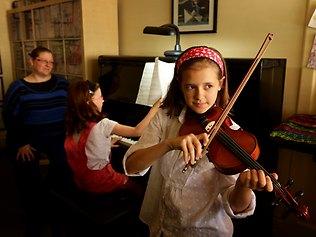Arts, the thinking kid's guide to success
MUSIC teacher Katie Eury does not need to be convinced of the benefits of arts education on young people.

MUSIC teacher Katie Eury does not need to be convinced of the benefits of arts education on young people's school performance and self-esteem: she sees it every day.
The violin and piano teacher in Melbourne's Clifton Hill gives private tuition to 70 students a week and has taught hundreds more in classrooms.
She has seen kids thrive because of music, such as violin student Tarlisha Simpson-Clayton, 10, and her own daughter Charlotte Eury Frigo, 7, who plays piano.
"They are not all going to be brilliant," Ms Eury said. "It doesn't matter how good they are, it's going to help their brain . . . It's like learning another language."
A study by researchers at the University of Sydney and the Australia Council for the Arts has found that arts education may benefit youngsters in more ways than previously thought.
They are better motivated academically, are more engaged in class and have a sense of satisfaction in their lives.
The study, conducted across two years, involved 643 students at 15 primary and secondary schools. Schools were selected for their emphasis on art, dance, drama, film/media or music.
Andrew Martin, professor of educational psychology at Sydney University, said the arts could benefit children regardless of their sex, age and socioeconomic background.
Crucially, students get the best results when they have high-quality arts participation and are not merely "chewing up hours on a violin".
"Up to now, most research had been looking at quantity or frequency (of arts participation)," Professor Martin said.
"This study also investigated the quality of children's engagement in the arts, and that emerged as the strongest effect."
Other factors come into play, such as children having adult role models, their development of interpersonal skills and a home life where the arts are valued.
Professor Martin said future studies might discover exactly how the arts do good things for young minds.
"Often in the arts, it's an area of problem-solving and creativity that tends to develop higher-order thinking skills that are useful," he said. "It takes you to a qualitative level, higher than just doing rote-learning for history or English. It tends to cultivate a certain way of thinking."
Professor Martin said the arts benefited students differently from other activities such as sport.
The findings have been published in the US in the Journal of Educational Psychology.


